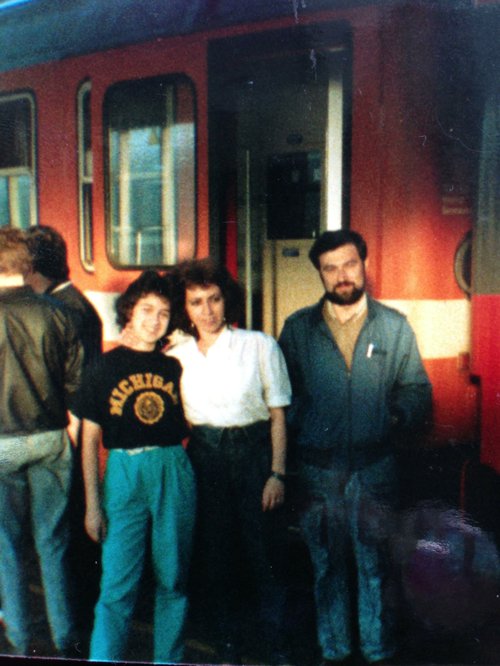

This week marks 29 years since my parents and I left everything we had and knew behind in Russia and began our journey to come to America as refugees. Wow.
 I was thirteen at the time and while the experience was difficult and unsettling for me, it’s only as an adult that I’ve been able to imagine the fear that my parents had to work through: Would we get permission to come to America? How would we eat in the refugee settlements? Would we be able to build a life once we arrived in America?
I was thirteen at the time and while the experience was difficult and unsettling for me, it’s only as an adult that I’ve been able to imagine the fear that my parents had to work through: Would we get permission to come to America? How would we eat in the refugee settlements? Would we be able to build a life once we arrived in America?
I am so grateful they did -- I got an amazing gift of building my life in America because my parents courageously took the most giant leap into the unknown.
Perhaps because we were forced to survive so much uncertainty I became a big planner – and someone for whom uncertainty is never a comfortable place to be.
And yet, as much as I’ve often tried, I’ve learned that change is impossible to avoid. “Change is the only constant,” is how most of us experience life. So rather than trying to avoid uncertainty, I’ve been learning to be more comfortable within it through practice.
Here are some of the simple practices that have worked for me -- each one is based on one of the 5 Core Happier Skills. I hope you will try them and see if they help you, too.
Acceptance: Embrace uncertainty as an essential part of life
If this comes easily to you, awesome. But for me and many people I know – yes, I’m talking to you, planners and fixers – it requires ongoing practice to truly accept that we can’t plan our way to everything.
Part of practicing acceptance of uncertainty is being okay with your feelings about it. Do you feel worried? Stressed? Fearful? Acknowledge what you’re feeling and give yourself permission to feel the difficult feelings. Research shows writing down what you’re stressed about helps you move through your stress with a bit more ease.
Gratitude: Zoom in on what’s good
Our brain’s natural negativity bias means that when faced with uncertainty, we’re more likely to think about what might go wrong than what might go right. It’s also natural to feel fear about the future – and fear only adds fuel our negativity bias.
To counter this tendency to focus on the negative, write down 3 things you’re grateful for within the uncertainty. These can be anything at all, but when you make them specific and truly pause to appreciate them, you help your brain to pause its negativity spiral. Research shows that simply starting to think about something you’re grateful for releases serotonin, which gives you a mood boost, and dopamine, which encourages your brain to keep looking for things to appreciate.
Intentional Kindness: Reach out and be kind to someone
When we feel stressed or worried, we often shut down and ruminate on our worries. So, we have to practice getting out of our head and connecting to others to feel supported. The best way to do this is by doing tiny intentional acts of kindness.
Text a friend to check in. Smile and say thank you to the person who hands you your coffee at the coffee shop. Pause to chat with a colleague rather than rushing past them. Research shows that tiny positive interactions with others not only make us happier – our brains release oxytocin when we do tiny kind things, which makes us feel really good – but also help us feel supported when we’re going through difficult or uncertain times.
The Bigger Why: Build a bridge of resilience from your sense of meaning
When we’re uncertain about what and when, we can draw strength from connecting to our bigger why – the purpose of our efforts. For example, if you’re looking for a new job and feeling the stress of not knowing when you will find it and what it will be, think about why you are doing this search. Will the new job help you share more of your strengths to benefit others? Will it help you take better care of your family?
Research shows that connecting to our sense of meaning can help us get through challenges – including the stress and self-doubt that often come with uncertainty – with greater resilience. One reason for this is that our sense of meaning gives context to our stress: You’re not just stressed about finding a new job, but you’re stressed as part of doing something meaningful.
Take a few minutes to think about and write down your Bigger Why for what you’re pursuing and use it as your Bridge of Resilience when the uncertainty of the outcome gets the better of you.
Self-Care: Find comfort in daily rituals
When you feel unsteady or uncertain, having a few tiny rituals you can count on can be a huge help. I call these my Daily Anchors -- and as I write in my new book, Happier Now, creating a few simple Daily Anchors helped me through one of the darkest and uncertain times in my life.
Your Daily Anchors need not be complicated at all. They are simply things you can do to help you feel a bit more grounded and comforted. To come up with a few of your own, ask yourself these questions: What helps me feel centered and steady? What gives me a moment of peace of comfort when there’s a lot going on?
Jot down one or two Daily Anchors and make a commitment to do them every single day. This is a way to nourish yourself and help you get through the uncertain or difficult time in your life.
Don't miss your happier boost!
Subscribe to our weekly email to get practical tips and inspiration to help you feel more joyful and resilient.


